《旅游英语教程》Unit 1课程作业
《Unit 1 Travel Language Practice》作业设计方案-中职英语高教版202
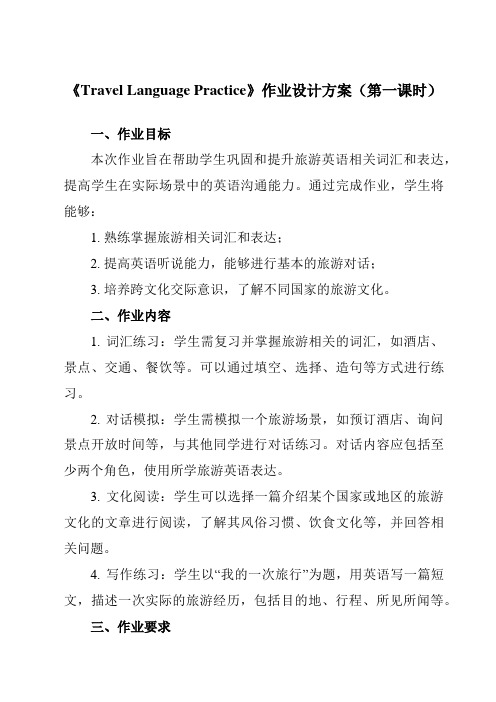
《Travel Language Practice》作业设计方案(第一课时)一、作业目标本次作业旨在帮助学生巩固和提升旅游英语相关词汇和表达,提高学生在实际场景中的英语沟通能力。
通过完成作业,学生将能够:1. 熟练掌握旅游相关词汇和表达;2. 提高英语听说能力,能够进行基本的旅游对话;3. 培养跨文化交际意识,了解不同国家的旅游文化。
二、作业内容1. 词汇练习:学生需复习并掌握旅游相关的词汇,如酒店、景点、交通、餐饮等。
可以通过填空、选择、造句等方式进行练习。
2. 对话模拟:学生需模拟一个旅游场景,如预订酒店、询问景点开放时间等,与其他同学进行对话练习。
对话内容应包括至少两个角色,使用所学旅游英语表达。
3. 文化阅读:学生可以选择一篇介绍某个国家或地区的旅游文化的文章进行阅读,了解其风俗习惯、饮食文化等,并回答相关问题。
4. 写作练习:学生以“我的一次旅行”为题,用英语写一篇短文,描述一次实际的旅游经历,包括目的地、行程、所见所闻等。
三、作业要求1. 独立完成:学生需独立完成作业,不得抄袭;2. 准确规范:语言表达要准确规范,符合英语语法要求;3. 真实情境:模拟场景和写作内容要真实反映旅游情境,体现所学旅游英语知识;4. 按时提交:作业应在规定时间内提交,逾期不予评价。
四、作业评价1. 评价标准:根据学生的词汇练习、对话模拟、文化阅读和写作练习四个部分,分别给予评分;2. 评价方式:教师对学生提交的作业进行批改,并给出评价意见;3. 评价结果:综合四个部分的评分,给出总评成绩,作为本次作业的评价结果。
五、作业反馈部分1. 学生自评:学生在完成作业后,对自己的表现进行自我评价,总结优点和不足;2. 师生交流:教师根据评价结果,与学生进行交流,鼓励学生发扬优点,改进不足;3. 改进建议:教师根据学生反馈,提出针对性的改进建议,帮助学生更好地提升英语沟通能力和旅游素养。
通过本次作业,学生能够进一步巩固和提升旅游英语知识,提高实际沟通能力,为未来的工作和生活做好准备。
《Unit 1 Travel Language Practice》作业设计方案-中职英语高教版202
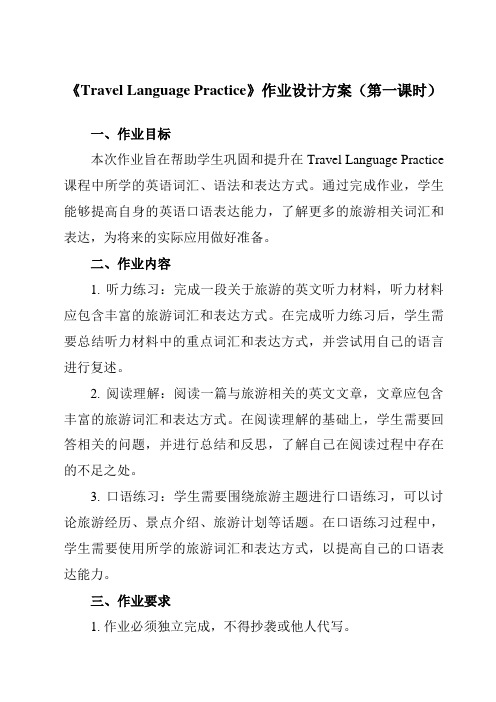
《Travel Language Practice》作业设计方案(第一课时)一、作业目标本次作业旨在帮助学生巩固和提升在Travel Language Practice 课程中所学的英语词汇、语法和表达方式。
通过完成作业,学生能够提高自身的英语口语表达能力,了解更多的旅游相关词汇和表达,为将来的实际应用做好准备。
二、作业内容1. 听力练习:完成一段关于旅游的英文听力材料,听力材料应包含丰富的旅游词汇和表达方式。
在完成听力练习后,学生需要总结听力材料中的重点词汇和表达方式,并尝试用自己的语言进行复述。
2. 阅读理解:阅读一篇与旅游相关的英文文章,文章应包含丰富的旅游词汇和表达方式。
在阅读理解的基础上,学生需要回答相关的问题,并进行总结和反思,了解自己在阅读过程中存在的不足之处。
3. 口语练习:学生需要围绕旅游主题进行口语练习,可以讨论旅游经历、景点介绍、旅游计划等话题。
在口语练习过程中,学生需要使用所学的旅游词汇和表达方式,以提高自己的口语表达能力。
三、作业要求1. 作业必须独立完成,不得抄袭或他人代写。
2. 听力练习和阅读理解需要按照要求完成相应的题目数量,并总结所学的词汇和表达方式。
3. 口语练习需要围绕主题进行,尽可能使用所学的旅游词汇和表达方式,时间控制在5-8分钟内。
4. 提交作业的时间和形式:作业应在规定时间内提交电子版文档,文档应包括听力材料复述、阅读理解答案、口语练习录音等相关内容。
四、作业评价1. 教师将对作业进行批改,对于完成情况良好的学生给予相应的加分奖励。
2. 对于作业中出现的问题和不足之处,教师将进行记录和分析,以便在后续的教学中加以改进。
3. 作业评价将作为平时成绩的一部分,对于多次作业仍不能达标的学生,将给予相应的辅导和帮助。
五、作业反馈部分1. 学生应认真听取教师的评价和建议,针对自身存在的问题进行反思和改进。
2. 学生可以向教师提出自己在完成作业过程中遇到的问题和困惑,教师将给予相应的解答和帮助。
旅游英语教程 Unit 1
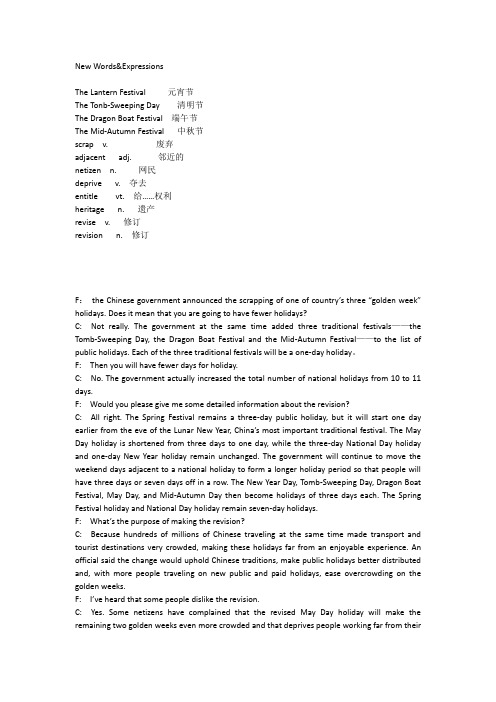
New Words&ExpressionsThe Lantern Festival 元宵节The Tonb-Sweeping Day 清明节The Dragon Boat Festival 端午节The Mid-Autumn Festival 中秋节scrap v. 废弃adjacent adj. 邻近的netizen n. 网民deprive v. 夺去entitle vt. 给……权利heritage n. 遗产revise v. 修订revision n. 修订F:the Chinese government announced the scrapping of one of country’s three “gol d en week” holidays. Does it mean that you are going to have fewer holidays?C: Not really. The government at the same time added three traditional festivals——the Tomb-Sweeping Day, the Dragon Boat Festival and the Mid-Autumn Festival——to the list of public holidays. Each of the three traditional festivals will be a one-day holiday。
F: Then you will have fewer days for holiday.C: No. The government actually increased the total number of national holidays from 10 to 11 days.F: Would you please give me some detailed information about the revision?C: All right. The Spring Festival remains a three-day public holiday, but it will start one day earlier from the eve of the Lunar New Year, China’s most important traditional festival. The May Day holiday is shortened from three days to one day, while the three-day National Day holiday and one-day New Year holiday remain unchanged. The government will continue to move the weekend days adjacent to a national holiday to form a longer holiday period so that people will have three days or seven days off in a row. The New Year Day, Tomb-Sweeping Day, Dragon Boat Festival, May Day, and Mid-Autumn Day then become holidays of three days each. The Spring Festival holiday and National Day holiday remain seven-day holidays.F: What’s the purpose of making the revision?C: Because hundreds of millions of Chinese traveling at the same time made transport and tourist destinations very crowded, making these holidays far from an enjoyable experience. An official said the change would uphold Chinese traditions, make public holidays better distributed and, with more people traveling on new public and paid holidays, ease overcrowding on the golden weeks.F: I’ve heard that some people dislike the revision.C: Yes. Some netizens have complained that the revised May Day holiday will make the remaining two golden weeks even more crowded and that deprives people working far from theirhometowns of the chance to go back home for family gatherings. They have even voiced their worry that a lot of company employees will not be off on the newly-added traditional festival holidays.F: Does the government know that?C: Yes. The spokesman said the revision could not satisfy all the people, whose interests might vary, but did respect the opinion of a majority. He said that 75 percent of the people were in favor of the change and that 60 percent of the netizens agreed to the way the May Day holiday was revised.F: I had paid holidays when I worked in my country. Do people have paid holidays in China? C: Yes. All employees of government agencies, enterprise and public-service institutions are entitled to take paid holidays after serving the same employer for one year. Employees who have worked for ten to 19 years will have ten days and those who have worked for 20 years and above would have 15 days.F: That’s wonderful.。
旅游英语教程参考答案
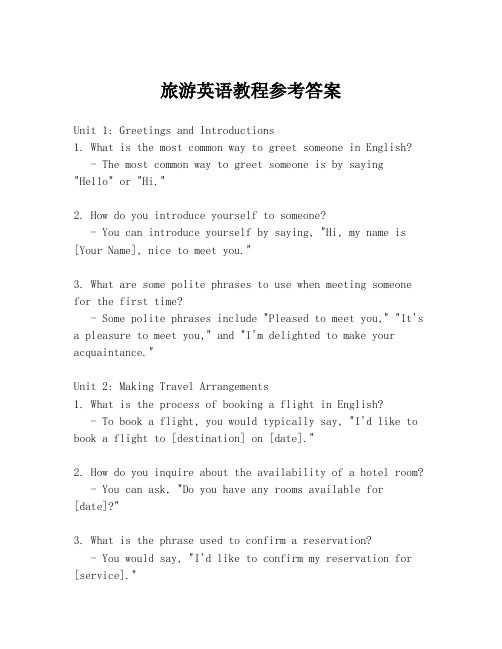
旅游英语教程参考答案Unit 1: Greetings and Introductions1. What is the most common way to greet someone in English? - The most common way to greet someone is by saying "Hello" or "Hi."2. How do you introduce yourself to someone?- You can introduce yourself by saying, "Hi, my name is [Your Name], nice to meet you."3. What are some polite phrases to use when meeting someone for the first time?- Some polite phrases include "Pleased to meet you," "It's a pleasure to meet you," and "I'm delighted to make your acquaintance."Unit 2: Making Travel Arrangements1. What is the process of booking a flight in English?- To book a flight, you would typically say, "I'd like to book a flight to [destination] on [date]."2. How do you inquire about the availability of a hotel room? - You can ask, "Do you have any rooms available for [date]?"3. What is the phrase used to confirm a reservation?- You would say, "I'd like to confirm my reservation for [service]."Unit 3: At the Airport1. What do you say when you need to check in for a flight?- You would say, "I'd like to check in for my flight to [destination]."2. How do you ask for directions to the gate?- You can ask, "Excuse me, could you please direct me to gate [number]?"3. What is the phrase used to request assistance with luggage? - You can say, "Could you help me with my luggage, please?"Unit 4: On the Plane1. How do you ask for a blanket or pillow?- You would ask, "Excuse me, could I get a blanket and a pillow, please?"2. What do you say if you need to use the restroom?- You can say, "Excuse me, where is the restroom, please?"3. How do you request a beverage or snack?- You would say, "Could I have a [beverage or snack], please?"Unit 5: At the Hotel1. What is the phrase used to check into a hotel?- You would say, "I have a reservation for [your name],I'd like to check in."2. How do you ask about the hotel's amenities?- You can ask, "What amenities does the hotel offer?"3. What do you say if you need to request extra towels?- You would say, "Could I get some extra towels, please?"Unit 6: Dining Out1. How do you ask for a table at a restaurant?- You would say, "Do you have a table for [number of people]?"2. What is the phrase used to request the menu?- You can ask, "May I see the menu, please?"3. How do you order a meal in English?- You would say, "I'd like to order [dish name], please."Unit 7: Sightseeing1. How do you ask for directions to a tourist attraction?- You can ask, "Could you tell me how to get to [attraction]?"2. What is the phrase used to buy a ticket for a tour?- You would say, "I'd like to buy a ticket for the [tour name]."3. How do you inquire about the operating hours of a museum? - You can ask, "What are the opening hours of the museum?"Unit 8: Shopping1. How do you ask for the price of an item?- You would ask, "How much does this cost?"2. What is the phrase used to negotiate a price?- You can say, "Could you give me a discount?"3. How do you ask for a receipt?- You would say, "May I have a receipt, please?"Unit 9: Emergency Situations1. How do you ask for help in an emergency?- You would say, "I need help, this is an emergency!"2. What is the phrase used to call for medical assistance? - You can say, "I need a doctor, please!"3. How do you report a lost item?- You would say, "I've lost my [item], can you help me find it?"Unit 10: Cultural Etiquette1. How do you show respect for local customs?- You can say, "I am here to learn about and respect your customs."2. What is the phrase used to apologize for a cultural mistake?- You can say, "I apologize。
旅游英语Unit+1+Tourism+and+Tour+Guides4

Professionalism
• represent not only your personal appearance and behavior but that of your company as well as your country. • depend on the way you dress yourself, your ability to use and understand languages, your manners and social skills and your attitude toward your work and the people you are providing services to. In general , your professionalism is your appropriate behavior when you are conducting a tour.
• A Teacher
• help inbound tourists learn and understand the history, culture, traditions and important ideas of your city as well as China.
• An Entertainer
• Jobs done by Tour Guides
• navigating, communicating, interpreting, rolemodeling appropriate behavior, entertaining, treating injury, ensuring safety, managing disasters etc.
• make yourself a humorous entertainer, not a stage actor but a friendly, active, high-spirited person to help your guests enjoy their travel.
《Unit 1 Travel Group Work》作业设计方案
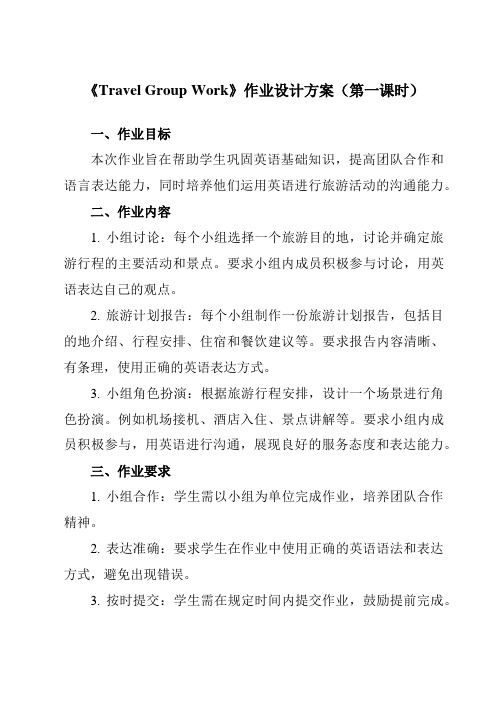
《Travel Group Work》作业设计方案(第一课时)一、作业目标本次作业旨在帮助学生巩固英语基础知识,提高团队合作和语言表达能力,同时培养他们运用英语进行旅游活动的沟通能力。
二、作业内容1. 小组讨论:每个小组选择一个旅游目的地,讨论并确定旅游行程的主要活动和景点。
要求小组内成员积极参与讨论,用英语表达自己的观点。
2. 旅游计划报告:每个小组制作一份旅游计划报告,包括目的地介绍、行程安排、住宿和餐饮建议等。
要求报告内容清晰、有条理,使用正确的英语表达方式。
3. 小组角色扮演:根据旅游行程安排,设计一个场景进行角色扮演。
例如机场接机、酒店入住、景点讲解等。
要求小组内成员积极参与,用英语进行沟通,展现良好的服务态度和表达能力。
三、作业要求1. 小组合作:学生需以小组为单位完成作业,培养团队合作精神。
2. 表达准确:要求学生在作业中使用正确的英语语法和表达方式,避免出现错误。
3. 按时提交:学生需在规定时间内提交作业,鼓励提前完成。
4. 鼓励创新:鼓励学生在作业中尝试不同的表达方式和创意,提高英语实际应用能力。
四、作业评价1. 评价标准:根据作业内容是否符合要求、语言表达是否准确、小组合作是否有效等标准进行评价。
2. 评价方式:教师评价与小组互评相结合,注重过程评价和结果评价的结合。
3. 反馈方式:对于作业中存在的问题,教师将给予及时反馈和指导,帮助学生改进和提高。
同时,鼓励学生在作业反馈中积极交流和分享,共同提高英语水平。
五、作业反馈1. 反馈内容:包括学生对本次作业的自我评价、小组间的互评结果以及教师的评价和建议。
2. 反馈方式:通过班级微信群、QQ群或电子邮件等方式进行反馈,鼓励学生积极参与讨论和改进。
3. 落实改进:学生应根据反馈结果认真总结经验教训,加强学习和训练,提高英语实际应用能力。
通过本次作业,学生将进一步巩固英语基础知识,提高团队合作和语言表达能力,为未来的职业发展打下坚实的基础。
《Unit 1 Travel Language Practice》作业设计方案-中职英语高教版202

《Travel Language Practice》作业设计方案(第一课时)一、作业目标本次作业旨在帮助学生巩固和运用所学的旅游英语词汇和表达,提高学生在实际场景中的英语沟通能力。
通过完成作业,学生将能够:1. 熟练掌握旅游相关词汇和表达;2. 提高英语口语表达能力,能够进行简单的旅游咨询和计划;3. 增强团队协作和沟通技巧。
二、作业内容1. 小组讨论:选择一个旅游目的地,讨论并确定旅游计划,包括交通、住宿、餐饮、景点等。
要求使用所学旅游英语词汇和表达进行讨论,并记录讨论过程。
2. 角色扮演:模拟旅游咨询和计划场景,进行角色扮演,分别扮演游客和导游,使用英语进行沟通。
3. 词汇练习:完成一份与旅游相关的词汇练习题,包括选择、填空、翻译等题型。
4. 归纳总结:对本次作业进行总结和反思,讨论遇到的困难和解决方案,以及所学到的旅游英语知识。
三、作业要求1. 小组合作:学生需以小组形式完成作业,每组不超过3人,共同讨论、分工、合作完成各项任务;2. 真实情境:讨论和角色扮演应围绕实际旅游场景进行,使用真实的旅游英语素材;3. 语言表达:要求使用正确的英语语法和表达方式,提高口语表达能力;4. 记录反馈:学生需记录作业完成过程中的问题和困难,以便老师进行作业评价和反馈。
四、作业评价1. 任务完成情况:评估学生是否按照要求完成了各项任务,包括小组讨论、角色扮演、词汇练习和总结归纳;2. 语言表达:根据学生的口语表达和书面表达进行评价,是否使用了正确的英语语法和表达方式;3. 团队协作:评估学生是否能够积极参与小组讨论和角色扮演等活动,发挥团队协作精神;4. 知识掌握:根据学生的词汇练习和总结归纳,评价学生对旅游英语知识的掌握程度。
五、作业反馈部分在作业评价后,老师将针对学生的表现和问题进行反馈。
对于表现优秀的小组和个人,给予表扬和奖励;对于存在的问题,老师将提供指导和建议,帮助学生改进和提高。
同时,学生也可以向老师提出自己的问题和困惑,寻求帮助和支持。
《Unit 1 Travel Language Practice》作业设计方案-中职英语高教版202
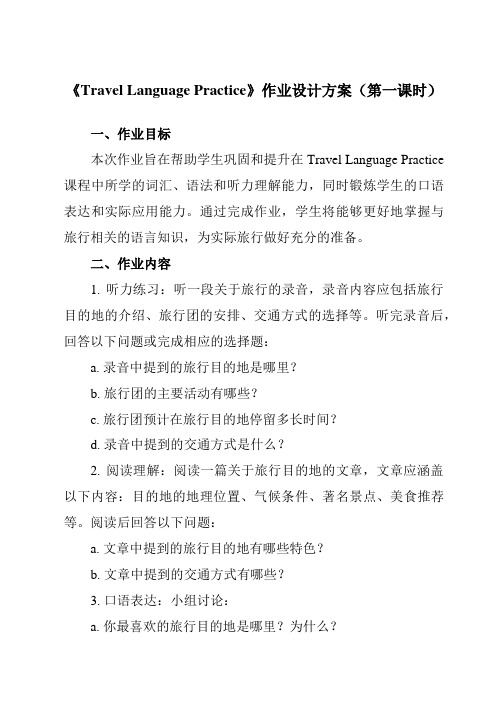
《Travel Language Practice》作业设计方案(第一课时)一、作业目标本次作业旨在帮助学生巩固和提升在Travel Language Practice 课程中所学的词汇、语法和听力理解能力,同时锻炼学生的口语表达和实际应用能力。
通过完成作业,学生将能够更好地掌握与旅行相关的语言知识,为实际旅行做好充分的准备。
二、作业内容1. 听力练习:听一段关于旅行的录音,录音内容应包括旅行目的地的介绍、旅行团的安排、交通方式的选择等。
听完录音后,回答以下问题或完成相应的选择题:a. 录音中提到的旅行目的地是哪里?b. 旅行团的主要活动有哪些?c. 旅行团预计在旅行目的地停留多长时间?d. 录音中提到的交通方式是什么?2. 阅读理解:阅读一篇关于旅行目的地的文章,文章应涵盖以下内容:目的地的地理位置、气候条件、著名景点、美食推荐等。
阅读后回答以下问题:a. 文章中提到的旅行目的地有哪些特色?b. 文章中提到的交通方式有哪些?3. 口语表达:小组讨论:a. 你最喜欢的旅行目的地是哪里?为什么?b. 在你过去的旅行经历中,最难忘的一次经历是什么?c. 在旅行中遇到语言障碍时,你会如何应对?三、作业要求1. 听力练习部分:请在听完录音后,仔细回答问题或完成选择题。
录音文本和答案请在提供的材料中查找。
2. 阅读理解部分:请仔细阅读文章,回答相关问题。
阅读材料和答案将通过班级学习平台提供。
3. 口语表达部分:请小组内讨论并分享各自的观点和经历,确保每位同学都有发言的机会。
讨论结束后,请将小组讨论的成果记录在纸上,以便提交作业。
4. 提交作业时间:请在下一节课开始前将作业提交至班级学习平台。
四、作业评价1. 评价标准:作业完成情况、回答问题的准确性、口语表达的流畅度等。
2. 评价方式:教师评价为主,小组互评为辅。
教师将根据评价标准对每位同学的作业进行评分和反馈,同时也会参考小组互评的结果进行调整。
3. 评价时间:作业评价将在完成作业后的一周内完成。
- 1、下载文档前请自行甄别文档内容的完整性,平台不提供额外的编辑、内容补充、找答案等附加服务。
- 2、"仅部分预览"的文档,不可在线预览部分如存在完整性等问题,可反馈申请退款(可完整预览的文档不适用该条件!)。
- 3、如文档侵犯您的权益,请联系客服反馈,我们会尽快为您处理(人工客服工作时间:9:00-18:30)。
Unit 1:课程作业(此作业也包含在课程PPT之中)Unit 1 A Chinese Cultural Tour(1)Exercises:Part One: Listening ActivitiesChinese Civilization(中华文明)1. Listen to the tape, and fill in the missing information you have heard from the tape.China, one of the four oldest civilizations in the world, has a (1) _______________ history of 5,000 years, and boasts rich cultural relics and historical sites. It is the inventor of compass, paper, gunpowder and (2)___________. The Great Wall, the Grand Canal and the Dujiangyan Irrigation Project are the three great ancient projects built (3)__________ years ago. Now they are the (4) _____________ of the rich culture heritage of the Chinese nation. Traditional religions are Taoism and Buddhism. (5) _________________ is much respected in China.Art, like religion, has developed over a period of more than 2,000 years. Calligraphy and painting are two of the most revered (6)_______________. Ancient buildings like temples, pagodas, palaces, long walls, corridors and wealth of antiquities and cultural (7)______________ are world-known. The Great Wall, the Terra-cotta Warriors and Horses in Xi’an, the Longmen Grottos in Henan, and the super Buddhist (8) ____________ of Leshan Giant Buddha in Sichuan are some of the most attractive cultural sites for foreign tourists. China, with its (9)________________ scenes of natural beauty such as Guilin and Jiuzhagou Valley, Up and Down of the Yangtze River, Mt. Lushan and many others have a lot to offer to (10)______________ visitors.2. Listen to the tape again, and answer the following questions.(1) What are the four greatest inventions of ancient China?(2) What are the three ancient projects which were built 2000 years ago?(3) What are the traditional religions of China? Do you think that Confucianism is a Chinese religion?(4) What are the famous cultural sites and natural sites in China? Give examples.Part Two: Situational DialogueConfucius(孔子)Ⅰ. Listen to the dialogue, and decide whether the statements are true or false. If it is true, put “T” in the space provided and “F” if it is false. (pages 5-6)1. ______ You can only find the Confucius Temple in Qufu, the hometown of Confucius in Shandong Province.2. ______ Kong Qiu was acclaimed as Saint Kong and highly respected by the emperors in feudal society.3. ______ Confucius was a teacher, but he only accepted the wealthy students.4. ______ Confucius was also a philosopher, and he mainly taught politics and philosophy.5. ______ Today’s quality-education is based on the concept of all-round development education advocated by Confucius.Part Four: ABC about TourismMass Tourism(大众旅游)Read the passage and choose the best answer from the four choices given below. (pages 10-11)()1. The Grant Tour can be defined asA. mass tourismB. travel for holidaysC. travel exclusively for pleasureD. travel mainly for education and pleasure()2. The idea of mass tourism in the modern sense did not exist in 18th century becauseA. people travel mainly for the official purposeB. people travel exclusively for the educational purposeC. people travel primarily for the business purposeD. few people traveled beyond their village and nearest market town.()3. Why did the Industrial Revolution speed up the rise of mass tourism?A. invention of trains and shipsB. rapid expansion of the middle class’s wealthC. the desire to know more about the worldD. A, B and C()4. One of the following factors did not facilitate the coming of mass tourism.A. increase numbers of car ownershipB. growth of motel chainsC. practical barriers to foreign travel within EuropeD. extensive use of package holidaysPart Five: Additional Know-howIII. TranslationChinese Local Religion-Taoism中国本土宗教——道教Translate the following sentences into Chinese. (pages 14-15)1. Taoism was indigenous(本土的) religion in China. Originated around the 2nd century A.D., it has exerted a far-reaching impact (深远影响) on the Chinese philosophy, folk customs (民俗), medical science, fine arts (美术), and Wushu (武术), etc.2. Zhang Daoling(张道陵) is credited as its founder, Lao Zi(老子) is regarded as itsmaster and his work and Dao de jing (Classic of the Way of Power《道德经》) is its main doctrine.3. By the 14th century, Taoism had been divided into many sects(派系)and developed into two main philosophies: Quanzhen Sect(全真道), emphasizing self-cultivation to attain immortality and Zhengyi Sect(正一道), involving belief in charms and spells.4. Daoist music is a kind of religious music with Chinese characteristics(中国特色), mainly used in religious rituals(礼仪) for blessing for auspiciousness(祈福迎祥) and so on, but has absorbed(吸纳) the ceremony music(典礼音乐) in imperial courts and folk music.5. The Daoist teachings(教仪) and view of moral(道德观), accordant with the spiritual civilization advocated(提倡) nowadays, would purify(净化) the people’s soul and guide them toward kindness.。
